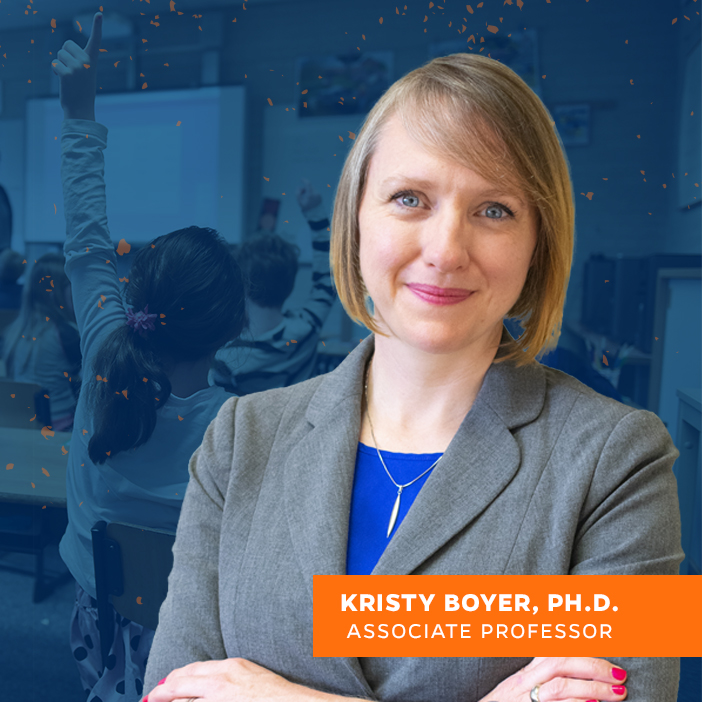Kristy Boyer, Ph.D., an associate professor in the University of Florida Department of Computer & Information Science & Engineering, recently received a $1.5 million grant from the National Science Foundation (NSF) to investigate artificial intelligence (AI) education for middle school students. This project, a collaboration between Dr. Boyer and Maya Israel, Ph.D., an associate professor in the UF College of Education, will shed light on the emerging field of AI education within the context of computer science and conversational applications for the K-12 population.
“We hope to further the community’s understanding of how kids can learn to design and build artificial intelligence,” Dr. Boyer said. “One of the most important kinds of artificial intelligence right now is the kind that has conversations with human beings. We see it all over in our daily lives.”
In this project, 210 middle school students from diverse, underserved schools with limited access to AI and computer science will engage in two-week summer camps to learn computer science. Researchers will investigate in what ways the experience can foster students’ long-term interest in computing and STEM-related fields. Participants will focus on learning to design and develop speech-based conversational systems.
“You’ve used these anytime you say ‘hey Siri’ or ‘hey Alexa’ or ‘hey Google.’ That is a speech-based conversational system,” Dr. Boyer said. “It’s speech-based because you’re talking to it as opposed to some other conversation systems where you have to type. It’s called a conversational system because it goes back and forth the way people would go back and forth in a natural conversation.”
Researchers will work with Alachua County public schools to disseminate information about the summer camp and how students can participate. There are no costs or requirements for students to participate, only that they show an interest in computer science. Students who complete the camp will also get to keep the smart speaker they learned to program.
The camps will be held each summer over four years, with the hope of previous participants returning in later years to create even more sophisticated projects and act as mentors for new participants. The camps will be on the east side of Gainesville at the Bridge Community Center, which is within walking distance of Abraham Lincoln Middle School.
“We know that parents are often at their jobs in the summer and getting the kids to and from camp could be a challenge,” Dr. Boyer said.
The camp curriculum will be guided by interest development: first, students express interest; then, the projects are intended to deepen that interest during the camp. Researchers will measure students’ level of interest over time, especially those that might not otherwise have developed an interest in STEM if they had not had the opportunity.
Dr. Boyer and Dr. Israel will be working with the summer camp participants, along with students from Dr. Boyer’s lab, the LearnDialogue Group, and Dr. Israel’s lab, the Creative Technology Research Lab. A handful of undergraduate students from UF, who will undergo extensive training and technical preparation, will also be hired as camp counselors.
The researchers are joined by an external evaluator, Tom McKlin, Ph.D., director at The Findings Group, who brings many years’ experience evaluating NSF projects focused on K-12 STEM and computing education. In addition, the team will rely on the expertise of their advisory board: Kinnis Gosha, Ph.D., the Hortenius I. Chenault Endowed Associate Professor and Division Chair at Morehouse College; Fox Harrell, Ph.D., a professor at the Massachusetts Institute of Technology; Shrikanth Narayanan, Ph.D., a professor at the University of Southern California; Meg Ray, K-12 Education Advisor at Cornell Tech University; Andie Ng, technical solutions consultant at Google; and Chris Stephenson, Ph.D., head of computer science education at Google.
Researchers are planning to hold the camps in person and are working with UF to ensure everyone can participate safely within COVID guidelines. They are also working with the community center to understand how much space will be available so they can determine how many students can participate in each camp.
“Hundreds of kids from lower-income neighborhoods are going to get to come and spend two whole weeks of their summer learning about computer science,” Dr. Boyer said. “There’s no experience required. They don’t have to be high-performing kids, they just have to be kids that are excited to build things that they can share with their friends and family.”

